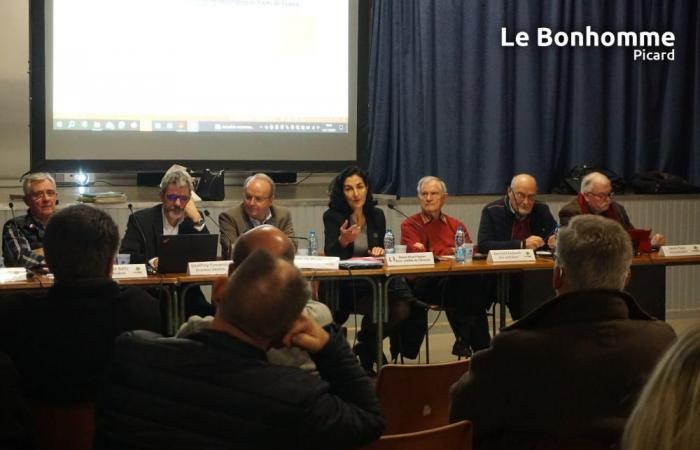Faced with an audience of elected officials concerned about state funding and the future of their subsidies, Noura Kihal-Flégeau played a balancing act in a complicated context.
Thursday November 14, 2024, she was the surprise guest of the community council of the Communauté de communes du Plateau Picard (CCPP). Noura Kihal-Flégeau, the sub-prefect of Clermont, wanted to meet the elected officials of the territory during this meeting and tried to reassure them in a difficult and uncertain context for the communities.
“It will not have escaped you, the committee of elected officials has not yet met and the new prefect, Jean-Marie Caillaud, arrives on November 25 so it is still early to know if he will keep the initial date of the commission I cannot come forward before this consultation”announced the State representative before recalling some figures: in 2024, between the Rural Territories Equipment Grant (DETR) and the Green Fund, nearly €870,000 was paid to the municipalities of the Picardy Plateau to support their projects.
“I think it’s a significant effort for a community of municipalities of 30,000 people. I think I announced it to you quite clearly, our priority is balance, so when I look at the grant requests, I give more to a municipality that has had nothing for 3 years than to another. to be as fair as possible. Then, I try to prioritize education, public buildings or even ecological transition.”
A little speech which did not reassure the elected officials, far from it. “We have a DETR problem. We filed a case two and a half years ago for video protection and we have had no response and in the meantime, there has been an increase. Was it not simpler to tell us that our file was not sufficient to obtain the grant rather than to make us wait because it hinders the functioning of small municipalities”underlined Xavier Matte, mayor of Sains-Morainvillers.
“I rarely take on these files because I prioritize the renovation of buildings and roads for accessibility and safety. Sometimes at the end of the course, I give up a little, but it’s rare”replied Noura Kihal-Flégeau.
More grants for churches
In line with her explanation on video protection, Noura Kihal-Flégeau also announced that she “didn’t do churches either”. A decision that surprised. “I made a request for ours, which is very beautiful but often used for deaths, unfortunately, comments Michaël Negi, mayor of Lieuvillers. I asked for €250,000 in subsidies, what do I do if the State doesn’t follow me?”. “We will have to find other means of financing, perhaps from the Regional Directorate of Cultural Affairs”the state representative then suggested.
The town of Bulles is experiencing a similar situation with work worth one million euros. “We are engaged in the restoration of the stained glass windows and bays. There are two phases of work remaining and we do not know what to do with the decreasing grant envelopes. No one can find a solution for me. As a community, we nevertheless have the obligation to be closed and covered”launched Christelle Vermeulen, 1e deputy mayor. “For churches, I have no solution. I have too little money in the envelope to finance them”concluded the sub-prefect.
As mentioned by Xavier Deneufbourg, mayor of Montiers, the solution may be found among patrons and private financiers as for the church in his village, which was selected this year by the Heritage Foundation to receive a check for 50 000 €.
Among the other structuring projects in the area, the renovation of the former Lidl which should become a performance and entertainment venue. A project for which the community is expecting €940,000. “If you can remember us”said Olivier de Beule, president of the CCPP, adding that he was very worried about the public accounts of the State and for the DETR. A concern shared by Jean-Louis Hennon, mayor of Courcelles-Epayelles.
“If the envelopes decrease, we need direction because if we are informed about the State's priorities, we can move forward as municipalities. So it would be good, by the start of the year, to have these orientations and to know where we are going to then consider our budget.”
As a promise in the face of the difficulties that elected officials encounter, Noura Kihal-Flégeau indicated that the DETR would not move. “But for all that, I cannot perform a miracle and carry out two major structuring projects in a district like Clermont.”
ZRRs attract and annoy
The opportunity also for the elected official to speak and discuss another black spot in the territory: medical desertification. If a new dentist has just started work at the health center for 3.5 days per week, there is still concern. “I met a certain number of professionals who are deep in thought. They are thinking of moving their activity to a rural revitalization zone (ZRR). In the territory, we already have few doctors and those who remain are looking to go elsewhere”alerts the elected official, mayor of Gannes.
In our sights, the neighboring community of communes of Oise Picarde which is in ZRR, which means that health professionals do not pay taxes for the 5 years following their installation. “I think that doctors should be removed from this ZRR system because it is a profession that is capable of paying a little tax.” At the same time, Olivier de Beule also announced another consequence of this problem of medical desertification: “In Saint-Just-en-Chaussée, two of the three pharmacies have layoff plans. Four people could lose their jobs,” continues the chosen one.
A problem to which the sub-prefect was not able to respond immediately.
Emeline Bertel







